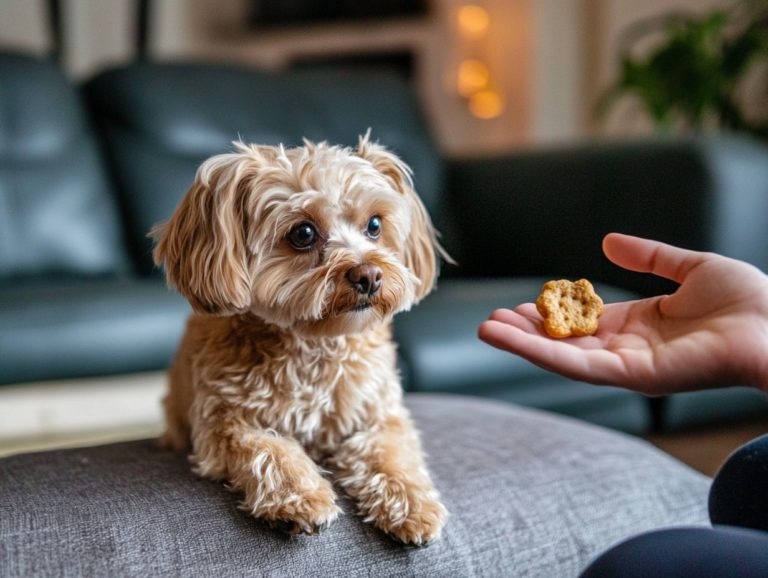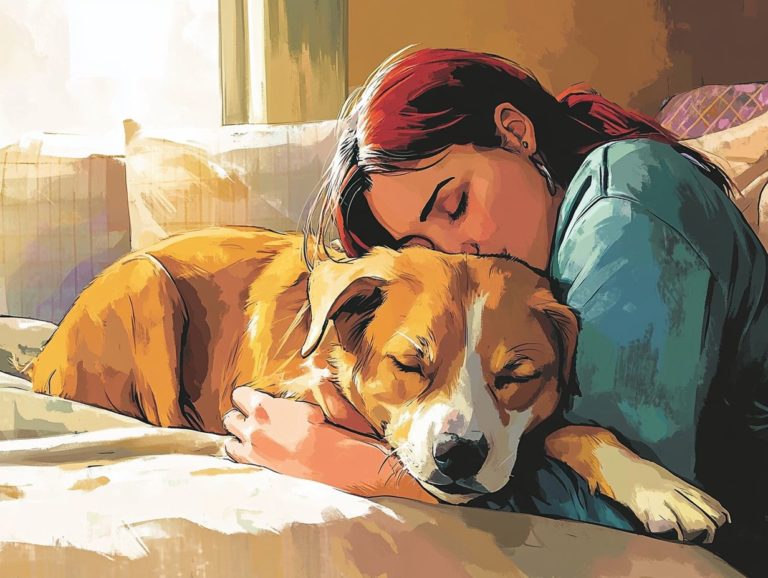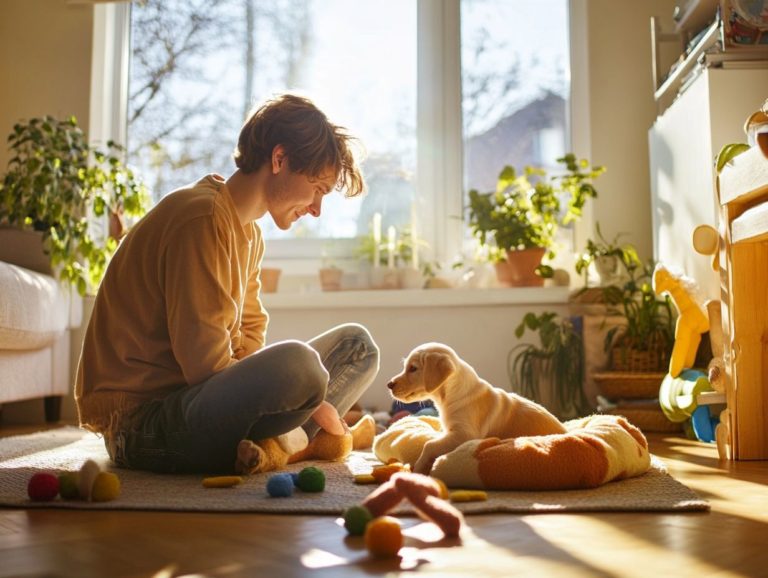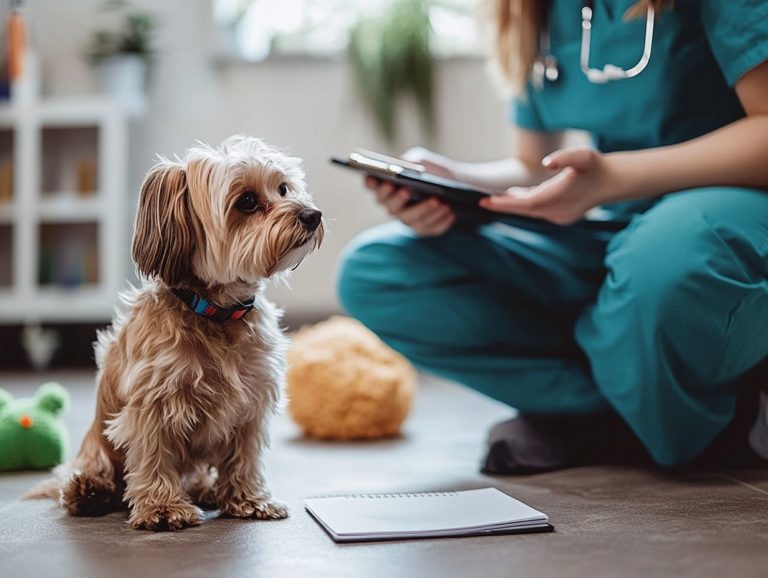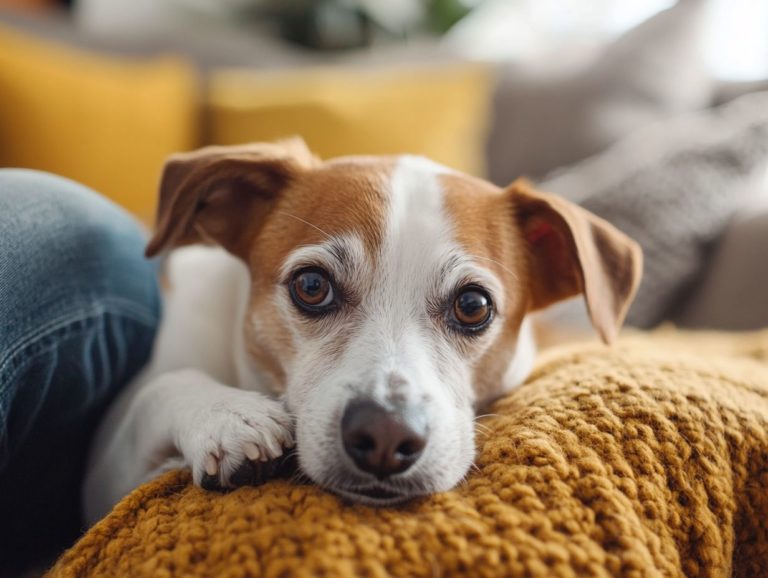Can Pet Anxiety Affect Their Relationship with Me?
Pet anxiety is more prevalent than you might think. It can profoundly affect the relationships you have with your furry companions.
Recognizing the signs and causes of pet anxiety is crucial for every pet owner. It can lead to behavioral shifts that challenge the bond you share with your animal.
Let s dive into how you can tackle pet anxiety and strengthen your bond! This article explores how pet anxiety manifests, its various triggers, and effective management strategies, offering insights to enhance your relationship.
Contents
Key Takeaways:
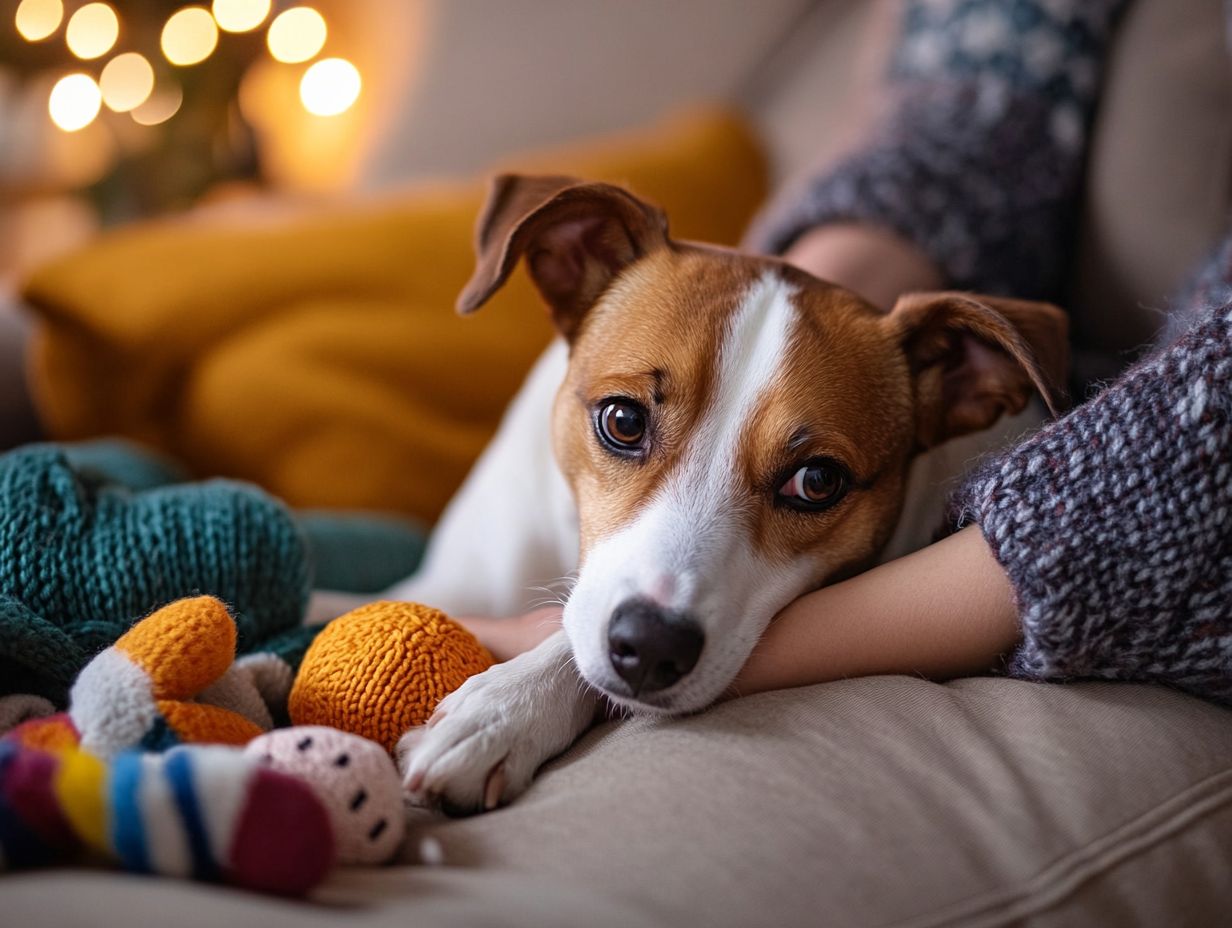
- Pet anxiety can strain your relationship with your furry companion, leading to behavioral changes.
- Recognize signs of anxiety like excessive barking, destructive behavior, or withdrawal, and address these issues promptly!
- Common triggers include separation, changes in routine, and past traumatic experiences. Understanding these factors can help manage your pet’s anxiety.
The Link Between Pet Anxiety and Human Relationships
The intricate connection between pet anxiety and human relationships can significantly impact your emotional attachment and mental health outcomes as a pet owner. Research indicates that anxiety disorders, like a common anxiety condition and social anxiety disorder, can be intensified by the stress of caring for anxious pets. If you’re wondering is it normal for pets to have anxiety, understanding this link can help you manage both your and your pet’s well-being.
This dynamic underscores the vital role of social support and understanding in enriching your relationships with your pets.
What You Need to Know About Pet Anxiety!
Understanding pet anxiety means recognizing the emotional bond between you and your furry companion. This often manifests in behavior patterns and stress responses in dogs, leading to questions like is anxiety in pets a behavioral issue? This can affect your own mental health and influence how you perceive your pet’s needs.
Research suggests that your attachment style shapes both your behavior and that of your pet. A secure attachment helps you pick up on stress signals from your dog, leading to healthier coping strategies. Conversely, an anxious attachment can result in misinterpreting your pet’s anxiety, inadvertently reinforcing negative behaviors.
By grasping these interconnections, you can effectively manage your pet’s needs and your own mental health, creating a more balanced and supportive environment for both of you.
How Pet Anxiety Can Affect Human Relationships
Pet anxiety can profoundly influence your relationships, shaping emotional bonds and potentially leading to feelings of loneliness and depression. Understanding whether pet anxiety can be cured is crucial, as the attachments you develop can create a mediation model where your bond with your pet is directly affected by their stress levels.
When your pet experiences anxiety, it’s easy to feel overwhelmed. This can lead to frustration or guilt, inadvertently straining your relationship with them. Understanding how anxiety affects a pet’s daily life can help. For instance, if you have an anxious dog that barks excessively, you might isolate them or avoid social activities, further worsening their anxiety.
This creates a cycle where both your well-being and your pet’s become intertwined, fostering an environment ripe for misunderstanding and emotional distress.
To enhance the quality of your relationship, consider implementing:
- Positive reinforcement training
- Seeking professional guidance
- Creating a safe space for your pet
These steps can help you feel more connected and less burdened. Building routines and engaging in calming activities together can strengthen your bond, positively impacting your overall family dynamic and mental health.
Is your pet showing signs of anxiety? Let s find solutions together! Consider taking action today to enhance both your and your pet’s well-being.
Signs of Pet Anxiety
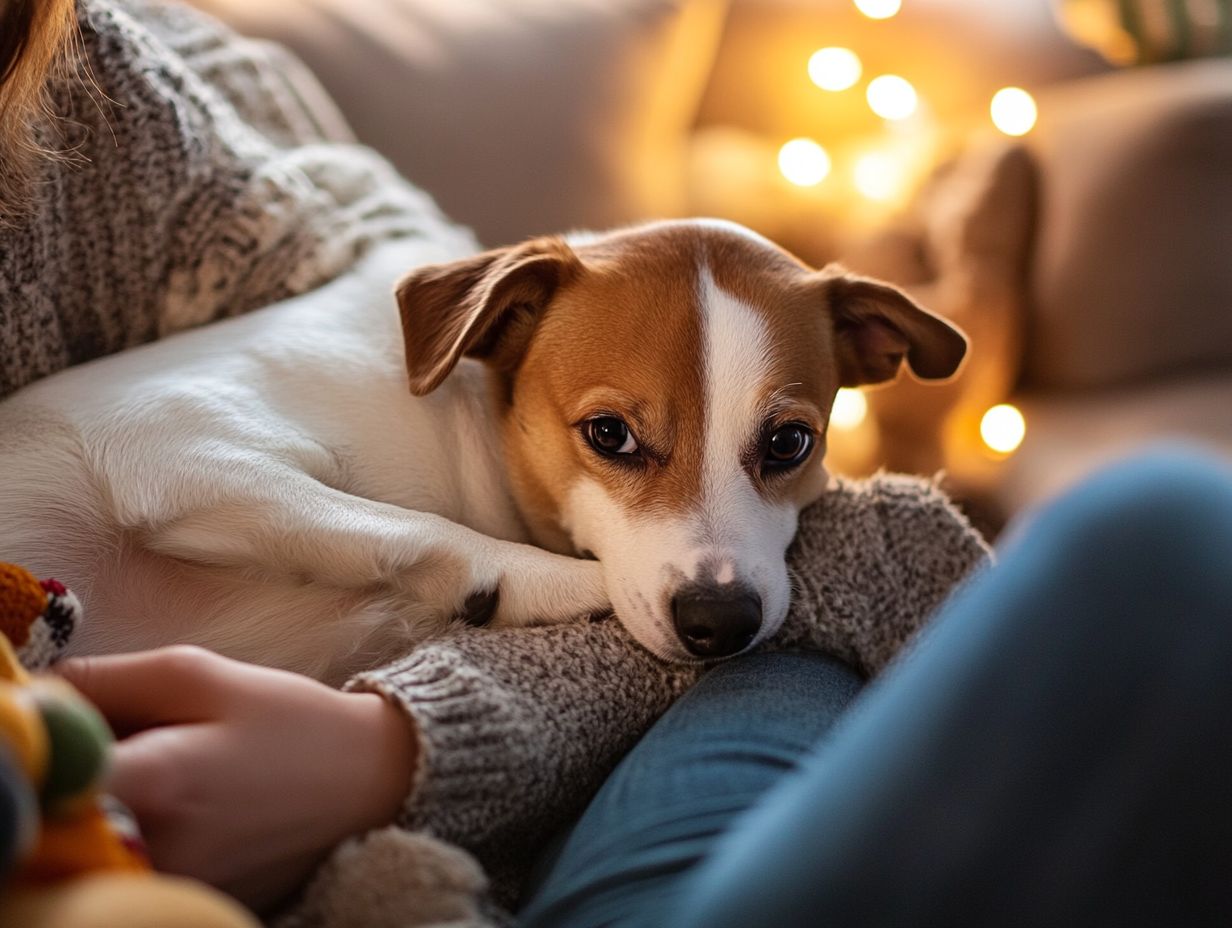
Recognizing the signs of pet anxiety is essential for you as an owner to offer the appropriate support and care. Behavioral changes in dogs often signal underlying symptoms of anxiety or attachment issues.
These signs can take many forms, affecting not only your pet s well-being but also your own mental health.
Behavioral Changes to Look Out For
Behavioral changes in your pets may include excessive barking, destructive antics, or even withdrawal and altered eating habits. These are critical signs of anxiety that reveal deeper emotional needs tied to their bonding styles, and you may wonder can pet anxiety be treated effectively.
For instance, if your pet is acting clingy or howling persistently, it might be showing signs of insecure attachment. This indicates a heightened need for reassurance from you. On the flip side, if you notice your pet suddenly isolating itself or refusing to engage in play, this could signal a more avoidant bonding style, suggesting that it feels overwhelmed and requires some space.
Recognizing these behaviors is crucial for providing the emotional support they need. For example, a dog that constantly seeks your attention may thrive with structured playtime, while a cat that retreats to a quiet corner might need gentle encouragement and patience to feel secure in its environment.
Causes of Pet Anxiety
The causes of pet anxiety are complex, often stemming from a blend of common triggers and deeper issues like early life trauma and bonding behaviors. Understanding is pet anxiety becoming more common can help you mitigate stress levels and enhance your pet’s emotional well-being.
Common Triggers and Contributing Factors
Common triggers for pet anxiety include loud noises, changes in the environment, and social situations. These factors can worsen existing anxiety disorders. Recognizing these triggers is vital for providing the emotional support your furry friend needs.
By understanding these triggers, you can start to notice patterns in your dog s behavior that signal distress. For example, welcoming a new family member or moving can lead to signs of fearfulness or withdrawal. Events like fireworks or thunderstorms often provoke significant anxiety, so you must create a safe haven immediately where your dog can retreat.
To manage these triggers, implement consistent routines and desensitization techniques, which help pets gradually get used to their fears. Offering calming aids like anxiety wraps or pheromone diffusers can greatly assist in alleviating your pet’s emotional turmoil.
Managing Pet Anxiety
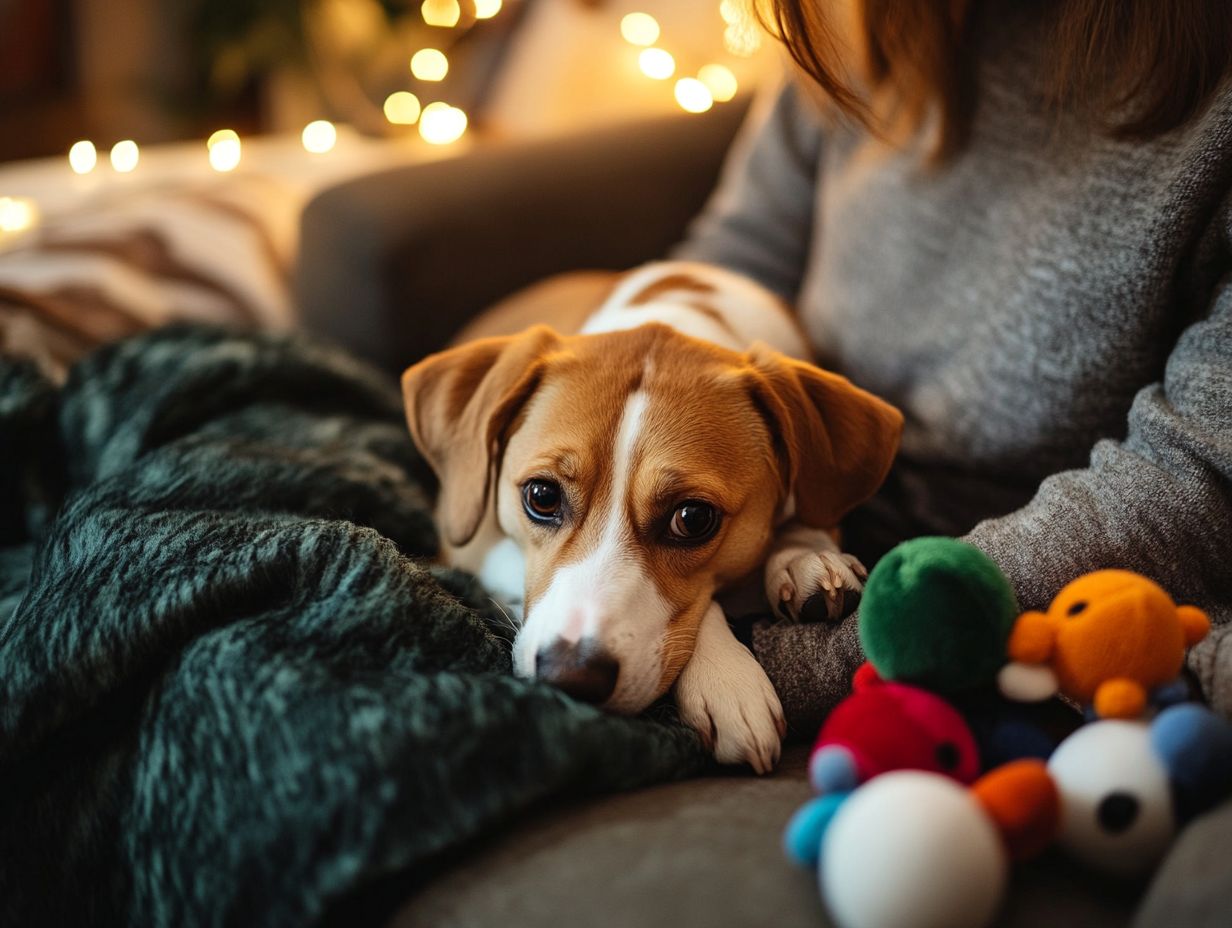
Effectively managing your pet’s anxiety involves a thoughtful combination of techniques that provide emotional support, enhance pet care, and cultivate positive experiences. These actions can lead to improved behavior patterns and a gradual reduction in anxiety symptoms over time.
Effective Techniques and Strategies
Implementing effective techniques to manage pet anxiety starts with understanding bonding behaviors and creating strategies that strengthen your connection with your pet. These techniques can greatly enhance the well-being of both you and your furry companion.
By identifying the specific triggers that cause anxiety in your pet, you can develop tailored strategies that create a comforting environment. Establishing regular routines, offering socialization opportunities, and spending quality time together can foster a sense of security in your pet. Engaging in activities like training, play, or simply cuddling helps alleviate your pet’s stress and enriches your experience together.
These practices encourage a healthier lifestyle, as both you and your pet benefit from shared interactions and the mutual support you provide during anxious moments.
Improving the Human-Pet Relationship
Enhancing the bond between you and your pet is essential for nurturing a deeper emotional connection. This can be accomplished through shared experiences that not only strengthen that bond but also enrich your social support.
By investing in these moments, you pave the way for a more secure attachment with your pet. Ultimately, this contributes to improved mental health for both of you!
Ways to Strengthen the Bond
Strengthening the bond between you and your pet is essential for enhancing emotional closeness and fostering healthier attachment styles. Effective pet care strategies can significantly improve your attachment as a caregiver and promote overall well-being.
To cultivate this connection, prioritize engaging in regular interactive playtime. This not only provides your pet with necessary physical stimulation but also deepens your emotional ties.
Establishing a consistent routine elevates trust levels. Pets thrive when they know what to expect. This builds a secure attachment.
Rewarding your pet for good behavior during training sessions helps foster a sense of teamwork and mutual respect. Incorporating daily check-ins or quiet moments of affection can greatly enhance communication. This nurtures a deeper understanding between you and your pet.
By being attentive to your pet s body language and responses, you can refine your approach. This further solidifies this vital bond.
Frequently Asked Questions
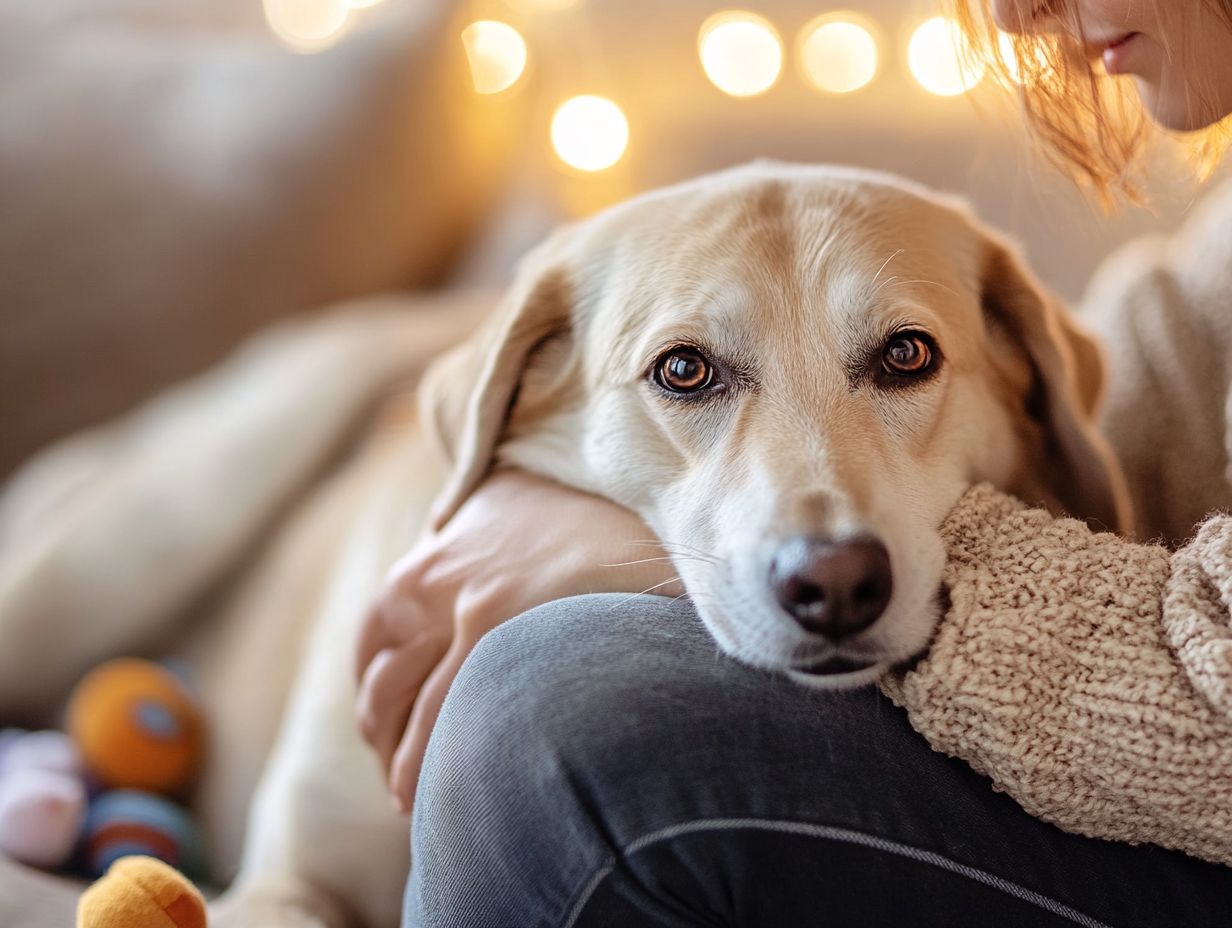
Can Pet Anxiety Affect Their Relationship with Me?
Yes, pet anxiety can impact your relationship with your pet. Just like humans, pets can experience anxiety, and can pet anxiety change over time? This can affect their behavior and interactions with you.
How can I tell if my pet is experiencing anxiety?
- Excessive barking or meowing
- Destructive behavior
- Hiding or avoiding interaction
- Changes in appetite or sleep patterns
If you notice any of these behaviors, don t wait! Consult with your veterinarian for a proper diagnosis.
What can cause pet anxiety?
Many factors can contribute to pet anxiety, including:
- Past traumas
- Changes in routine or environment
- Separation from their owner
- A lack of socialization
Identifying the root cause is important to address and manage anxiety effectively.
How can pet anxiety impact our relationship?
Pet anxiety can lead to changes in your pet’s behavior and interactions with you. This makes it difficult to bond and maintain a positive relationship. Understanding whether separation anxiety affects all pets can also help address the stress and frustration for both you and your pet.
What can I do to help my pet with anxiety?
Consult with your veterinarian to create a treatment plan that may include behavior modification techniques, environmental changes, and potentially medication. It s important to be patient, consistent, and understanding while helping your pet cope with their anxiety.
Can pet anxiety be cured?
While there is no cure for pet anxiety, it can be managed and improved with proper treatment and support. With patience and understanding, you can help your pet live a happier and less anxious life, strengthening your relationship in the process!


